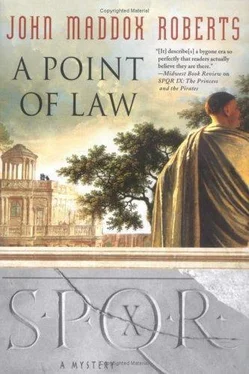John Roberts - A Point of Law
Здесь есть возможность читать онлайн «John Roberts - A Point of Law» весь текст электронной книги совершенно бесплатно (целиком полную версию без сокращений). В некоторых случаях можно слушать аудио, скачать через торрент в формате fb2 и присутствует краткое содержание. Год выпуска: 0101, ISBN: 0101, Издательство: St. Martin, Жанр: Исторический детектив, на английском языке. Описание произведения, (предисловие) а так же отзывы посетителей доступны на портале библиотеки ЛибКат.
- Название:A Point of Law
- Автор:
- Издательство:St. Martin
- Жанр:
- Год:0101
- ISBN:9780312337254
- Рейтинг книги:5 / 5. Голосов: 1
-
Избранное:Добавить в избранное
- Отзывы:
-
Ваша оценка:
- 100
- 1
- 2
- 3
- 4
- 5
A Point of Law: краткое содержание, описание и аннотация
Предлагаем к чтению аннотацию, описание, краткое содержание или предисловие (зависит от того, что написал сам автор книги «A Point of Law»). Если вы не нашли необходимую информацию о книге — напишите в комментариях, мы постараемся отыскать её.
A Point of Law — читать онлайн бесплатно полную книгу (весь текст) целиком
Ниже представлен текст книги, разбитый по страницам. Система сохранения места последней прочитанной страницы, позволяет с удобством читать онлайн бесплатно книгу «A Point of Law», без необходимости каждый раз заново искать на чём Вы остановились. Поставьте закладку, и сможете в любой момент перейти на страницу, на которой закончили чтение.
Интервал:
Закладка:
The door to the balcony was flanked by a pair of large, latticed windows and beneath one of these was his desk. It was a very fine one, Egyptian work of ebony inlaid with ivory. Next to it was a wooden honeycomb that held scrolls, rolled papers, and wax tablets. A silver-mounted horn tube held reed pens, and a fine crystal stand held different colors of ink in little pots shaped like lotus flowers.
Lying on the desk, half unrolled as if put down in the midst of reading, was a book whose excellent parchment was supple and slightly ragged at the edges, a clear sign that this was a favorite work, often read. It appeared to be a speech or collection of speeches arguing points of law. Such books were the inevitable texts for training aspiring lawyers.
Folded on a cupboard next to the desk lay his wardrobe. Among the tunics, most bore the narrow purple stripe of an eques , but two had the broad stripe to which a senator was entitled. There were two togas. One was white, doubtless the one he’d worn when berating me in the Forum the previous day. The other was the toga praetexta , with the broad purple border of curule office.
“He came prepared,” I remarked. “And he certainly had confidence. He expected admission to the Senate and a curule chair. Like that Greek athlete who showed up at Olympia with his statue already made. At least he didn’t lay in a supply of tnumphator’s robes. I suppose even his presumption had limits.”
“Look at this,” Hermes said. Accomplished thief that he was, he’d found a small drawer cleverly hidden among the decorative carvings of the desk. It held a signet ring; a massive thing of solid gold, its surface oddly but attractively granulated. Its large stone was pure sapphire with a Medusa head carved intaglio. It looked to me like Greek work. I examined it briefly and tossed it back to him.
“The man was full of surprises, wasn’t he? Can his correspondence be less interesting?” I began to pull papers out and spread them on the desk. “Well, I might have expected it,” I said disgustedly.
“That’s Greek, isn’t it?” said Hermes. He could read and write Latin well enough, but he had never learned to read Greek, although, like me, he could speak conversational Greek passably. Anyone who traveled widely has to learn some Greek, as it is spoken everywhere. But poetic and literary Greek is another matter. Many educated men, like Cicero, were as comfortable with Greek as with their native language, but I was not among them. I could piece my way through a simple letter in Greek if given enough time, but I could see that my schoolboy Greek wouldn’t serve me here.
“It isn’t just Greek,” I told him, “it’s in some sort of cipher.”
“Someone coming,” Hermes muttered. I heard footsteps on the stairs. The noise from the street outside had masked the sounds of someone entering the house. I swept up the documents I’d spread out and stuffed them inside my tunic even as Hermes shut the tiny drawer. By the time the men shouldered their way into the room, we had assumed poses of dignified innocence.
“What are you doing here?” demanded the first one through. He was the red-haired lout, and he wasn’t alone. Behind him was the one Hermes had pummeled, and there were others on the stair. “How did you get in?”
“Same as you, through the front door,” Hermes said. “It wasn’t locked.”
“As for what we’re doing here,” I said, “I came here to see these putative witnesses against me. But we’ve found no sign that anyone was ever here except Marcus Fulvius, despite your claim to the praetor Juventius this morning.” Actually, we had not yet had time to examine the top floor, but by now I was convinced that these witnesses were entirely fictitious.
“You’re a liar!” shouted the battered one. “You came here to steal!”
“How about you?” I said, going immediately on the counterattack. “Thought you’d take advantage of your friend’s death, did you? Thought you’d just run over here and lift whatever’s loose and easily fenced before his relatives showed up, eh? Well, you won’t get away with it this time!” Meanwhile, we were sidling toward the door.
“Don’t be absurd!” said the red-haired one. “Stop them!”
Immediately, we reversed direction. We had no way of knowing how many might be on the stairway and in the rooms below. I sprang for the balcony as Hermes drew his dagger and covered my retreat. One of the political perquisites of age, dignity, and high office was that you could let someone else do most of your fighting and concentrate on saving your own hide. In my younger days, engaging in street fights was seen as merely one of the ordinary activities of Republican political life. It was, however, thought to be beneath the dignity of a candidate for praetor or consul.
I looked over the low railing, picked the softest-looking patch of pavement below, and-encumbered by my toga-scrambled over the rail, hung by my fingers a moment, then dropped. I landed without incident, grateful not to have slipped in one of the many noxious substances that coat Rome’s streets. One good thing about recent sea duty: It keeps the knees supple.
Hermes, show-off that he was, flourished his dagger, gave a last, defiant shout, then actually leapt over the railing, dropped ten feet, and landed on the balls of his feet, as easily as a professional tumbler. He grinned at me and resheathed his dagger while passersby gaped. They didn’t gape all that much though. Senators flying out of windows and off balconies were not all that rare a sight. Caesar had once flown thus, stark naked with his nose streaming blood, broken by an aggrieved husband.
“What now?” Hermes asked.
“Would’ve served you right if you’d slipped in a pile of shit,” I said, unreasonably jealous that he’d cut so much better a figure than I had in our escape.
“I see no one’s pursuing us,” he said, casting a wary eye toward the front door of the house.
“It’s not what they were there for,” I said, “and they don’t want to make a public fuss about it right now.” I studied the angle of the sun. We still had some hours of daylight left. I patted the front of my tunic, causing a reassuring crackle of papyrus. “I got some of those letters. Let’s go find someone who can translate them for us.”
“Maybe we can find out about this, too.” He made a magician’s flourish and the massive signet ring lay in his hand. He’d deftly palmed it as he’d shut the hidden drawer.
“Sometimes,” I admitted, “I’m glad I didn’t raise you right.”
5
The Goldsmiths’ Quarter in those days lay in a small block of houses and shops on the Via Nova just across from the ancient Mugonia Gate, near the eastern end of the Forum. Unlike other quarters of the City, this one had its own wall, low but strong, its heavy gates guarded by club-wielding slaves whose loyalty was guaranteed by their excellent terms of service: five years of duty followed by freedom and a large enough stake to buy a house or a small shop. The Goldsmiths’ Guild had a special license for their little fortress and its arrangements, granted by the censors and renewed every five years as long as anyone could remember. The jewelers and other dealers in precious materials had similar arrangements with the censors. Rome was so full of thieves that they needed these special precautions to practice their trade at all.
The headquarters of the guild was in a modest house just within the main gate. They needed nothing more pretentious because they held their annual banquets at the nearby Temple of the Public Penates.
Next to the old gate Hermes and I paused long enough to buy snacks from a street vendor, our narrow escape having given us an appetite. We bought grilled sausage and onions wrapped in flat bread and doused with garum . From another vendor we got cups of cheap wine, and we sat beneath the shade of a fine plane tree to discuss matters before consulting with the goldsmiths.
Читать дальшеИнтервал:
Закладка:
Похожие книги на «A Point of Law»
Представляем Вашему вниманию похожие книги на «A Point of Law» списком для выбора. Мы отобрали схожую по названию и смыслу литературу в надежде предоставить читателям больше вариантов отыскать новые, интересные, ещё непрочитанные произведения.
Обсуждение, отзывы о книге «A Point of Law» и просто собственные мнения читателей. Оставьте ваши комментарии, напишите, что Вы думаете о произведении, его смысле или главных героях. Укажите что конкретно понравилось, а что нет, и почему Вы так считаете.









